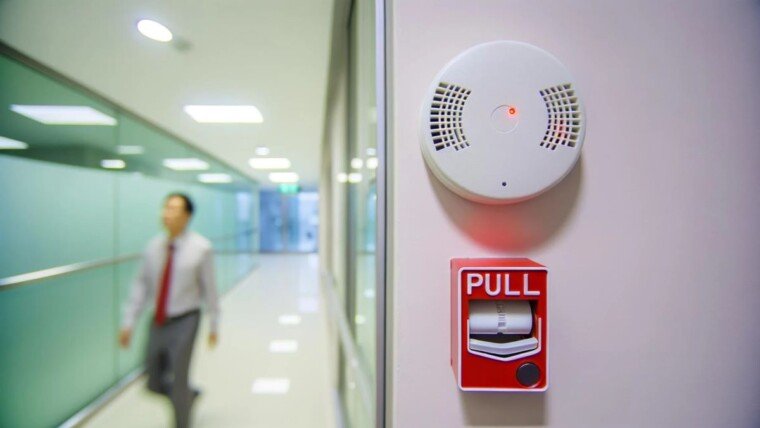Warehouses are the beating hearts of many businesses. They store valuable goods, house critical inventory, and support the logistics that keep operations flowing smoothly. Because of this, protecting these spaces from potential disasters like fire is not just a regulatory necessity but a fundamental part of responsible business operations. A robust fire alarm system isn’t just an option—it’s an essential defense against devastating loss.
Choosing the right fire alarm system requires understanding your warehouse’s unique needs and risks. Especially in densely populated urban areas, where building codes and safety standards can be strict, it’s important to ensure the fire protection system you choose is both compliant and effective. For instance, fire alarm installation in London must meet local fire safety standards and be equipped to detect smoke, heat, or flames quickly in a variety of conditions.
The Importance of Fire Protection in Warehouses
Fires in warehouses can escalate rapidly, often resulting in severe damage due to the large volume of combustible materials, high ceilings, and complex layouts. Whether you’re storing paper goods, electronics, chemicals, or food products, every item comes with a specific fire risk. A well-planned fire alarm system acts as an early warning mechanism, giving employees the chance to evacuate safely and enabling first responders to act swiftly.
In addition to protecting people and assets, having a reliable fire alarm system in place can reduce insurance premiums and help ensure compliance with local regulations. Business owners who fail to implement adequate fire protection measures risk fines, lawsuits, and potentially the complete loss of operations.
Choosing the Right Fire Alarm System
The first step in fire protection is selecting a system tailored to your warehouse’s size, structure, and contents. You’ll want to evaluate several key elements:
-
Type of fire detection: Smoke detectors, heat detectors, and flame detectors all serve different purposes. A combination of these may be ideal depending on your storage materials.
-
Alarm communication: Modern fire alarms can be connected to emergency services automatically, ensuring faster response times.
-
Zoning capabilities: Large warehouses benefit from zoned alarm systems, allowing you to pinpoint the exact area where the fire is detected.
-
Scalability: Your system should grow with your business and adapt to future needs.
For example, if you operate multiple warehouse locations or plan to expand, your alarm infrastructure should support that growth.
To ensure your system functions flawlessly, working with experienced professionals is a must. Whether you’re updating an old system or installing a new one, always consult a certified installer. A trusted security system installer in London can evaluate your premises and customize a fire alarm setup that meets both safety and legal requirements.
Integration with Burglar Alarm Systems
While fire is a major threat, it’s not the only one. Warehouses are also common targets for theft and vandalism, particularly those storing high-value goods. For complete protection, consider integrating your fire alarm with a burglar alarm system.
Integrated systems provide centralized control, allowing warehouse managers to monitor and manage threats more efficiently. Alarm panels can be programmed to notify both fire departments and security teams simultaneously, offering a layered approach to warehouse safety.
In areas like Harrow, where warehouse crime rates may be a concern, having a dual-purpose alarm system can be a smart investment. With burglar alarm system installation in Harrow, businesses can bolster security while streamlining their alarm infrastructure.
Maintenance and Monitoring
Installing a fire alarm system is only the first step. Ongoing maintenance is critical to ensuring reliability during emergencies. Without regular checks, even the most advanced systems can fail. Here are a few best practices:
-
Regular inspections: Schedule inspections every 6 to 12 months to check for faulty sensors or wiring issues.
-
Battery replacements: Many alarm systems rely on backup batteries in case of power failure. These should be replaced annually.
-
Testing protocols: Regularly test the system using manufacturer-recommended procedures. Make sure all staff know how to respond during drills.
-
Monitoring services: Consider professional 24/7 monitoring that alerts fire and emergency services even when your premises are unoccupied.
Investing in a monitoring service can be a game changer for warehouse security. It adds a vital layer of protection when human presence isn’t guaranteed—during nights, weekends, or holidays.
Employee Training and Fire Safety Plans
No alarm system can function optimally without human cooperation. Training warehouse staff in fire safety procedures is equally important. Every team member should know:
-
Evacuation routes and assembly points
-
How to use fire extinguishers
-
How to respond to fire alarms and emergency signals
In addition, develop a comprehensive fire safety plan that outlines emergency procedures, assigns roles, and is reviewed regularly. Post signage prominently, conduct regular fire drills, and create a culture where safety is a shared responsibility.
Conclusion
Warehouse fires can be catastrophic, but with the right fire alarm system and proactive security strategy, they are preventable. Choosing a system tailored to your specific layout and operational needs is critical. Whether you’re focused on compliance, insurance requirements, or peace of mind, your fire protection measures should never be an afterthought.
Partnering with experienced professionals for fire alarm installation in London or security upgrades in Harrow can make all the difference. When combined with burglar alarms, staff training, and consistent monitoring, your warehouse will be equipped to handle threats efficiently and effectively.
Don’t wait for a fire incident to take action—invest in safety today, and protect your business for the future. Inquire now and get a free quote for your security system installation.




